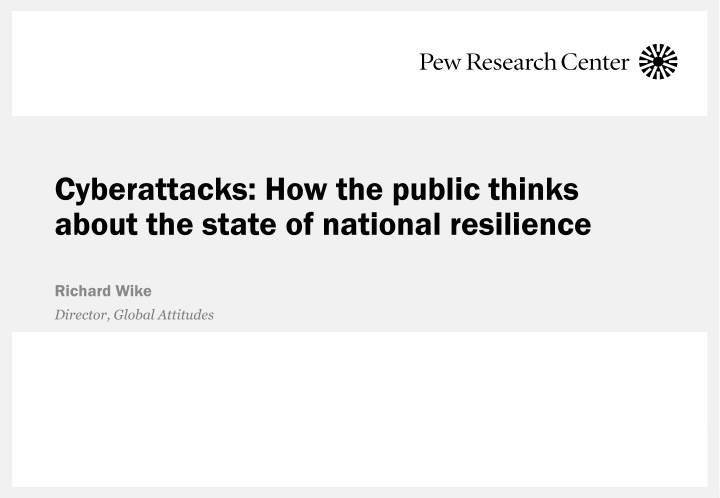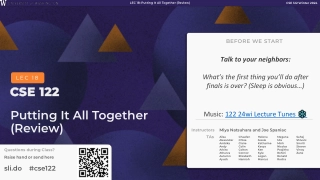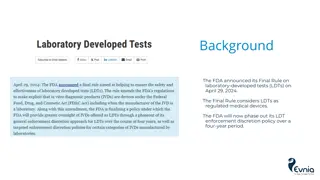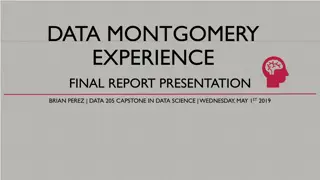
Public Perceptions on Global Threats: Cyberattacks, Climate Change, and National Resilience
Explore the findings from Pew Research Center's survey on how the public perceives global threats such as cyberattacks, climate change, and national resilience. The survey conducted across 26 countries reveals insights on major concerns like China, the US, Russia's power, global economy, and more. Discover how different regions prioritize threats and understand the varying perspectives towards security issues.
Download Presentation

Please find below an Image/Link to download the presentation.
The content on the website is provided AS IS for your information and personal use only. It may not be sold, licensed, or shared on other websites without obtaining consent from the author. If you encounter any issues during the download, it is possible that the publisher has removed the file from their server.
You are allowed to download the files provided on this website for personal or commercial use, subject to the condition that they are used lawfully. All files are the property of their respective owners.
The content on the website is provided AS IS for your information and personal use only. It may not be sold, licensed, or shared on other websites without obtaining consent from the author.
E N D
Presentation Transcript
Cyberattacks: How the public thinks about the state of national resilience Richard Wike Director, Global Attitudes
Pew Research Center Established 1996 Funded by The Pew Charitable Trusts, foundations Non-profit, non-partisan fact tank in Washington Since 2001, we have surveyed in 108 countries www.pewresearch.org @pewresearch 2
Methodology Survey conducted across 26 countries from May 14 to August 12, 2018, totaling 27,612 respondents Based on telephone and face-to-face interviews with nationally representative samples of adults 18 and older The margin of sampling error for the completed set of weighted data is 2.9% - 5.1% 3
GLOBAL THREAT PERCEPTIONS GLOBAL THREAT PERCEPTIONS 4
Global Threats Included in 2018 Survey I d like your opinion about some possible international concerns for (survey country). Do you think that __ is a major threat, a minor threat, or not a threat to (survey country)? a. China s power and influence b. the United States power and influence c. Russia s power and influence d. global climate change e. the Islamic militant group known as ISIS f. cyberattacks from other countries g. North Korea s nuclear program h. the condition of the global economy Note: Battery items were randomized. 5
Climate Change is Seen by More Countries as a Top Threat, but Many People Also Name ISIS & Cyberattacks as Top Security Concern Note: U.S. power and influence question not asked in the U.S., and Russia s power and influence not asked in Russia. 6
Across Much of Europe and North America, Climate Change is a Top Concern, but so are ISIS and Cyberattacks __ is a major threat to our country Top choice Global climate change Cyberattacks from other countries North Korea s nuclear program Russia s power and influence ISIS 33% 40 41 20 30 42 40 26 45 65 40 63% 55 59 56 47 39 41 51 40 53 52 69% 87 75 80 68 67 61 59 64 59 68 63% 67 59 45 66 72 55 35 64 53 61 90% 83 81 71 71 70 69 66 66 55 71 Greece France Spain Italy Germany Netherlands Sweden Hungary UK Poland MEDIAN 32 50 54 62 57 74 47 58 66 59 Canada U.S. 62 36 30 43 Russia 7
Publics Around the World Increasingly See Climate Change, Cyberattacks and American Power as Threats __ is a major threat to our country 2018 2017 2013 Global climate change N/A N/A N/A N/A N/A Note: Figures are medians across 23 countries surveyed in 2013, 2017 and 2018. Hungary, Netherlands and Sweden not included due to lack of trend data from 2013. U.S. power and influence question not asked in the U.S., and Russia s power and influence question not asked in Russia
THE LIKELIHOOD OF CYBERATTACKS THE LIKELIHOOD OF CYBERATTACKS 9
People Say Cyberattacks on National Security Information, Public Infrastructure and Elections are Likely in Their Country It is __ that, in the future, a cyberattack will result in Our country s sensitive national security information being accessed Elections in our country being tampered with Public infrastructure in our country being damaged 74% 69% 61% 33% 25% 21% Likely Unlikely Likely Unlikely Likely Unlikely Note: Percentages are medians based on 26 countries. Likely includes those who say a cyberattack is very or somewhat likely and those who volunteer that such attacks have already happened. Source: Spring 2018 Global Attitudes Survey. 10 March 20, 2025
Majorities in Europe, U.S. and Canada Believe Future Cyberattacks Will Breach National Security It is __ that, in the future, a cyberattack will result in our country s sensitive national security information being accessed Note: Total includes those who say a cyberattack is very or somewhat likely and those who volunteer such attacks have already happened. Source: Spring 2018 Global Attitudes Survey. 11 March 20, 2025
Many in Western Europe, U.S., Canada Believe Future Cyberattacks Will Damage Infrastructure It is __ that, in the future, a cyberattack will result in public infrastructure in our country being damaged Note: Total includes those who say a cyberattack is very or somewhat likely and those who volunteer such attacks have already happened. Source: Spring 2018 Global Attitudes Survey. 12 March 20, 2025
Roughly Half in European Nations Believe Cyberattacks Will Result in Election Tampering It is __ that, in the future, a cyberattack will result in elections in our country being tampered with Note: Total includes those who say a cyberattack is very or somewhat likely and those who volunteer such attacks have already happened. Source: Spring 2018 Global Attitudes Survey. 13 March 20, 2025
Democrats More Worried Than Republicans About Potential Election Tampering via Cyberattack It is likely that, in the future, a cyberattack will result in Note: Statistically significant difference in bold those who volunteer that such attacks have already happened. Source: Spring 2018 Global Attitudes Survey. bold. Likely includes those who say a cyberattack is very or somewhat likely and 14 March 20, 2025
HOW WELL PREPARED IS YOUR GOVERNMENT? HOW WELL PREPARED IS YOUR GOVERNMENT? 15
Differing Views on How Well Nations are Prepared to Handle Cyberattacks Our country is __ prepared to handle a major cyberattack Not well Well U.S. 43% 53% Canada 43 52 France 45 53 Netherlands 50 46 UK 46 46 Germany 52 45 Hungary 42 44 Spain 53 41 Sweden 61 36 Italy 48 30 Poland 48 30 Greece 58 24 MEDIAN 49 43 Note: Don t know and Refused responses not shown. Source: Spring 2018 Global Attitudes Survey. 16 March 20, 2025
Differing Views on How Well Nations are Prepared to Handle Cyberattacks Our country is __ prepared to handle a major cyberattack Not well Well Russia 19% 67% Indonesia Philippines South Korea Australia 23 64 40 58 47 48 50 47 Japan MEDIAN 52 41 47 50 Israel Tunisia 20 73 40 56 Kenya Nigeria 35 37 56 52 50 South Africa 44 Mexico Brazil Argentina 26-COUNTRY MEDIAN 58 37 78 16 81 9 26-COUNTRY 47 47 Note: Don t know and Refused responses not shown. Source: Spring 2018 Global Attitudes Survey. 17 March 20, 2025
People Who Support the Party in Power are More Likely to Say Their Country is Ready for Cyberattack Our country is well prepared to handle a major cyberattack Note: All differences shown are statistically significant. See Appendix for list of governing parties by country. Source: Spring 2018 Global Attitudes Survey. 18 March 20, 2025
All Pew Research Center reports are available online at www.pewresearch.org Richard Wike Director, Global Attitudes Research @RichardWike 19


![READ⚡[PDF]✔ Yup I'm Dead...Now What? The Deluxe Edition: A Guide to My Life Info](/thumb/20463/read-pdf-yup-i-m-dead-now-what-the-deluxe-edition-a-guide-to-my-life-info.jpg)

















